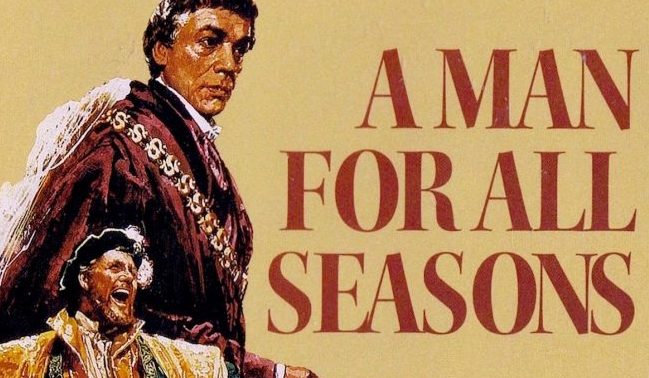
A Man For All Seasons (1966) Blu-ray Review

When A Man For All Seasons was released in early 1967 it swept the boards at that year’s Academy Awards, winning 6 Oscars (including Best Picture, Director and Actor) and was nominated for a further 2. This was validation for the film’s director, Fred Zinnemann who had came late into filmmaking and struggled before being recognised in spite of his highly acclaimed High Noon (1951) and From Here to Eternity (1953). A Man For All Seasons was based off a play by Robert Bolt and was adapted for this film by Bolt himself. Do not be fooled in believing that the film is another telling of the story of Henry VIII and his his wives. A Man For All Seasons is about one of the infamous King’s most learned and Renaissance courtier’s, Thomas More.
The film opens with a messenger rowing down the Thames from Hampton Court to Chiswick (then rural) where he delivers a sealed letter for Thomas More (Paul Schofield) to be summoned to Hampton Court for an audience with Cardinal Wolsey (Orson Welles). This is at a time when King Henry VIII (Robert Shaw) wishes to divorce his estranged first wife Catherine of Aragon in order he can marry Anne Boleyn (Vanessa Redgrave); this has been refused by the Pope. Catherine has not given Henry a son and heir. Sir Thomas More is a learned man and a former lawyer, but he is also a devout Catholic and was the only member of the Privy Council to oppose the divorce. At court More also has an enemy in Thomas Cromwell (Leo McKern) who positions himself against More. The King arrives in the royal barge on an impromptu visit to More and his family to try and persuade him to change his mind, but also offer him the position of Lord Chancellor after Wolsey’s recent death. Cromwell and the new Archbishop, Cramner (Cyril Luckham) along with an old friend who betrays him, Richard Rich (John Hurt) conspire against More’s position which could lead to calls for High Treason and his death.
Writer Bolt maintained many of the facts of the story without having to be employ too much in the way of artistic license. Schofield, not an actor widely seen on film and better known as a stage actor is unforgettable in the role of Thomas More, carrying the role with a great deal of dignity as he balances his religion and faith with his principles, the law and the respect for the royal line. Shaw as the King is seen less and has only one outstanding scene but is otherwise lesser in the role. Another giant actor in the film is Orson Welles as the rotund red caped Cardinal Wolsey. Again this is a small role, but one that has a great deal of impact on the film. Welles was aware of the effect of the crimson red in this scene and even effectively added some red eye drops into his eye. Like many films throughout the 1960s and early ’70s the film came with some strong financial backing from a Hollywood studio (Columbia Pictures in this case) but was made in Britain with a predominantly British cast (with the exception of Welles). The director, however, was an Austrian emigree who had made his name in Hollywood and in many cases this film follows the pattern of most of his best pictures. Like Gary Cooper’s unwitting sheriff in High Noon or similarly Audrey Hepburn as Sister Luke caught in the Second World War in The Nun’s Story (1959). A Man For All Seasons follows along the same lines as his previous films: a man of principles is alone in going against what he believes is right and this could spell his/her downfall. This common theme meant that there weren’t many happy endings in a Zinnemann film and so it is here, but never the less the closing narration tells us what the outcome of the other principles was.
Although the film is not packed with extras there are enough contextualising extras to give it some weight. One documentary is about the real Thomas More which does help highlight many of the accuracies contained within the film and close it was to the real story. Another is an interview with Neil Sinyard about Fred Zinnemann who knew the director and interviewed him and wrote a book on him, ‘Cinema of Character and Conscience’. The transfer highlights the beautiful camerawork of Ted Moore in the film as his camera captures the beauty of seasons and nature, beautufully captured in sharp Technicolor.
Chris Hick
